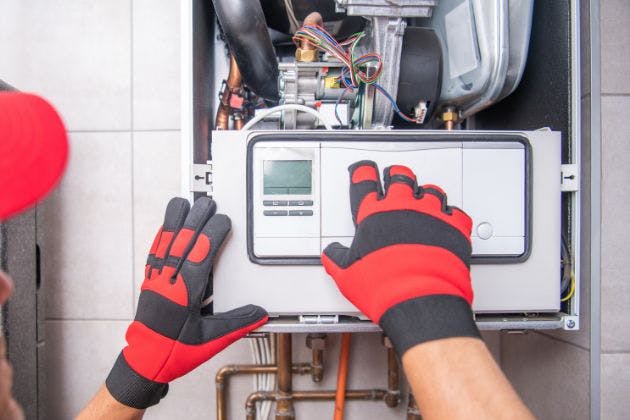A boiler is one of the most important systems in any home, providing heat and hot water throughout the year. Regular maintenance helps to prevent unexpected breakdowns, improve energy efficiency, and extend the lifespan of your system. Creating a yearly boiler maintenance checklist ensures that key checks and tasks are completed at the right time, keeping your boiler running safely and smoothly throughout the year.

Keeping Your Boiler in Top Condition Year After Year
Annual Professional Service
Booking a yearly service with a Gas Safe registered engineer should be at the top of your checklist. During this visit, the engineer will inspect and clean internal components, check for leaks, test the flue and combustion levels, and confirm the system’s overall safety. This visit ensures compliance with warranty requirements and keeps your boiler performing at its best.
Pressure and Leak Checks
Check your boiler’s pressure gauge every few months. Most systems operate best between 1 and 1.5 bar. Low pressure may cause heating issues, while high pressure can put stress on seals and components. Also, inspect visible pipework and valves for any signs of leaks or corrosion that may require attention.
Bleeding Radiators
Cold spots on your radiators often mean trapped air, which reduces heating efficiency. Bleed your radiators once or twice a year to release any air pockets and help your boiler distribute heat evenly throughout your home.
Carbon Monoxide Alarm Testing
Your carbon monoxide alarm plays a vital role in detecting harmful gases. Test it monthly and replace the batteries at least once a year. If your alarm is over seven years old, consider replacing it with a new one that meets current safety standards.
Cleaning the Boiler and Surrounding Area
Dust and debris can restrict ventilation or cause overheating. Gently clean the exterior of your boiler and ensure the surrounding area is clear of clutter. Proper airflow helps your system run more efficiently and safely.
Checking Thermostat and Controls
Inspect your thermostat and timer settings periodically to ensure they accurately reflect your household’s heating needs. Faulty or outdated thermostats can impact efficiency, so consider upgrading to a smart thermostat for improved temperature management and lower energy bills.
Preparing for Winter
Before the cold season arrives, run your heating system for a short time to check for unusual noises, pressure changes, or performance issues. Early testing helps identify problems before demand increases during winter.
Key Items to Include in Your Yearly Boiler Checklist
Book a Professional Service
The foundation of your boiler care routine should always be an annual service carried out by a Gas Safe registered engineer. During this visit, the engineer will clean and test key components such as the burner, heat exchanger, and flue, ensuring everything operates safely. They’ll also spot any early signs of wear and provide professional advice to help you avoid costly future repairs.
Check System Pressure and Bleed Radiators
Your boiler’s pressure should typically stay between 1 and 1.5 bar when the system is cold. If it drops below this, you may experience weak heating or noisy operation. Regularly checking the pressure helps maintain consistent performance. Radiators should also be bled once or twice a year to release trapped air, which can cause cold spots and reduce efficiency.
Test Your Carbon Monoxide Alarm
A functioning carbon monoxide alarm is an essential safety feature for any home with a gas boiler. Test your alarm monthly and replace the batteries at least once a year. Carbon monoxide is odourless and invisible, so ensuring your alarm is working correctly could save lives.
Inspect for Leaks or Corrosion
Even minor leaks can lead to larger issues if left unchecked. Examine visible pipework, joints, and valves for signs of rust, moisture, or discolouration. Corrosion can weaken components over time, so prompt attention helps preserve the system’s lifespan and safety.
Clean the Boiler and Ensure Clear Ventilation
Keeping the area around your boiler tidy and dust-free supports safe airflow and prevents overheating. Avoid storing items too close to the unit, particularly in cupboards or utility rooms. Occasionally, wipe down the boiler’s exterior to remove dust buildup that can affect its performance.
Review Thermostat Settings and Heating Schedule
Seasonal changes can impact the frequency of your heating system's operation. Review your thermostat settings at least twice a year to ensure they align with your daily routine. If your thermostat is outdated or inaccurate, upgrading to a smart control can help improve comfort and reduce energy use.
Check Flue Terminals for Blockages or Debris
The flue expels gases safely from your home, so it’s crucial that it remains clear at all times. Check the terminal outside for blockages such as leaves, nests, or debris. A blocked flue can prevent your boiler from ventilating properly and may trigger a system shutdown for safety reasons.
Reliable Boiler Maintenance in Whitton
Seeking expert assistance to maintain your boiler? New Boiler Whitton offers professional servicing, inspections, and ongoing maintenance to ensure your heating system operates efficiently and safely throughout the year. Call us on 07581413864 or fill out our contact form to book your annual boiler service today.
